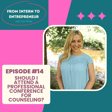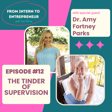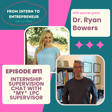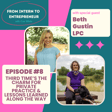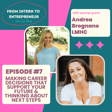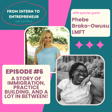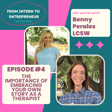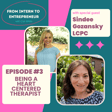
Episode 5: From Seeing 30 Clients A Week To Hosting International Retreats with Megan Gunnel Smith
Click here to join the From Intern To Entrepreneur Facebook community!
From Intern to Entrepreneur is the podcast for counseling graduate students (and other grad students in mental health fields) to start planning their journey to private practice while they're still in graduate school! Host, Cori White, started planning her journey while she was still in her graduate program and it paid off BIG to start planning EARLY.
In this episode of From Intern to Entrepreneur, Cori interviews Megan Gunnell Smith - a therapist, retreat leader, and head of a 18,000 therapist facebook community! Oh, and she wrote a book! Say what?! She is an INSPIRATION for grad students to hear about all the possibilities you have using your master's degree.
More about Megan:
Founder & Director of the Thriving Well Institute, psychotherapist, speaker, bestselling author of “Thriving as a Therapist” and international retreat leader with 24 years experience. She’s also a coach to therapists who want to learn how to build and scale their business and admin of the Thriving Therapists FB group with 18,000 members across the globe. Megan was selected as one of only 33 FB community admins in all of North America for the Meta Community Accelerator Award for 2022-2023. She has presented and facilitated workshops and retreats globally and nationwide. She manages a private practice, a group practice, her coaching and consulting business and loves to help others learn how to thrive at work and at home! A recovering perfectionist and recklessly brave, she's not afraid of most challenges.
Connect with her through her websites:
https://www.thrivingwellinstitute.com
Want to connect with Cori? Visit her website and reach out! www.frominterntoentrepreneur.com

